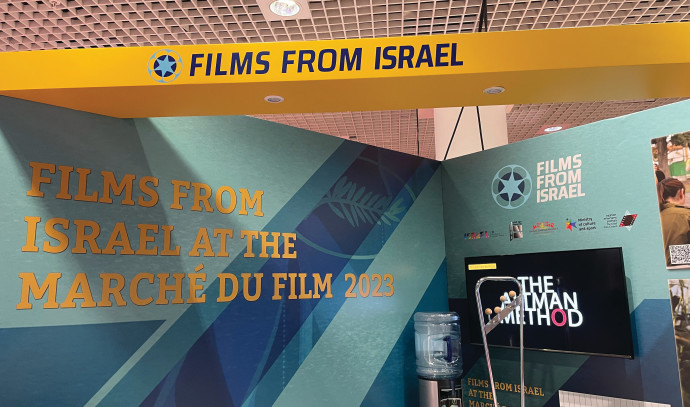CANNES – The Cannes Film Festival is all about commerce, art and glamour. Its 76th edition hosts 12,500 professionals from 121 countries and offers 4,000 feature, documentary and other films – presented in 33 screening venues – for sale at the Cannes Film Market.
Nineteen films are competing for Cannes’ top prize, the Palme d’Or. Other movies, including Killers of the Flower Moon by Martin Scorsese, are premiering out of competition.
Scorsese, 80, won the Palme d’Or in 1976 for Taxi Driver. His newest film reportedly cost $200 million and stars Leonardo DiCaprio and Robert De Niro. It portrays the FBI’s investigation into the 1920s murders of members of the Native American Osage Nation after oil is found on their land. The film received a nine-minute standing ovation at its premiere.
For anyone lucky enough to get an invitation to a gala screening in the Grand Théâtre Lumière, the dress code is evening dress or tuxedo.
For men, this means a black or navy-blue suit with a bow tie. A Vogue writer was initially turned away from the opening night ceremony featuring the new Johnny Depp film Jeanne Du Barry when he arrived in a pink and gold jacquard jacket. He was allowed in after a quick trip to a nearby Giorgio Armani store.
For women, the dress code requires an evening dress, a cocktail dress, a little black dress, a dark suit or a dressy top with black pants. Elegant shoes, with or without heels, are also required – although some stars flout this rule and walk the red carpet barefoot. These rules even apply to those who stand in long lines seeking scarce “space available” seats at the galas.
At the premiere of Indiana Jones and the Dial of Destiny, a film student who traveled 20 hours by bus from Brittany neared the front of the line only to be told that the black loafers she was wearing with her long green silk slip dress weren’t sufficiently elegant.
Because a busy schedule may not leave time to change before a premiere (or simply because it’s fun to dress up) many wear formal attire all day when making the rounds of parties, meetings, film screenings, press conferences, the Film Market, and the International Village – where countries and regions promote their films and encourage foreign filmmakers to come and shoot.
The Israeli and Jewish aspects of the Cannes Film Festival
ISRAEL’S PAVILION (stocked with Turkish coffee and Wissotzky Tea) occupies a prime location on a stretch of beach near the Palais des Festivals, allowing parties to spill out onto the sand. Kfir Swisa, CEO of the Israeli Ministry of Culture and Sport, affixed the pavilion’s mezuza.
This is Israel’s seventh year in the International Village. Some 70 Israelis are in attendance at the Festival, including Hedva Goldschmidt of Jerusalem-based Go2Films, which has facilitated the sale and distribution of over 300 movies.
Osnat Bukofzer, the artistic director and co-production expert of the Israeli pavilion, says “People want to hear our stories, so it’s important for us to put ourselves in the most important film festival in the world.”
“People want to hear our stories, so it’s important for us to put ourselves in the most important film festival in the world.”
Osnat Bukofzer
Israel has co-production agreements with 22 countries, and events at the Israeli pavilion allow members of the Israeli film industry to meet people from those places. The pavilion hosted an international women’s panel titled “Between Ageism and Equality,” to explore initiatives to keep women over the age of 40 in the film industry – or bring them back.
Another networking spot is the annual Film Festival Shabbat dinner hosted for the 15th time by Chabad’s Chai Center. About 80 people (90% of them Festival guests) attended this year.
Israeli filmmaker Nadav Lapid won the Jury Prize at the 2021 Cannes Festival for his film Ha’berech Ahed (“Ahed’s Knee”). No Israeli films are in the competition this year, but 13 films, including Monkey House by Avi Nesher, Ruth by Esty Shushan, and A Room of His Own by Matan Yair, are being promoted in the Film Market. A “Films from Israel” booth in the vast congress hall displays information about the films and offers space for filmmakers and distributors to negotiate deals.
A LEADING contender for the Palme d’Or is The Zone of Interest, about the Nazi commander of Auschwitz and his family, written and directed by Jonathan Glazer – who is Jewish – and loosely based on a novel by Martin Amis (who died hours after the film’s premiere).
Zone of Interest is a purposefully disorienting and ambiguous film about the banality of evil, with a brilliant score by Mica Levi (Oscar-nominated for Jackie) that sometimes sounds like a train descending into hell. The beautiful images on screen contrast shockingly with the horrors taking place nearby – horrors that the audience can hear but not see. The film is a co-production between companies in the US, UK and Poland.
Glazer spent two years researching the film, including a week-long visit to the Auschwitz-Birkenau Memorial and Museum. His other films are Sexy Beast, Birth, and Under the Skin.
Another leading Palme d’Or contender is the Japanese film Monster, directed by Hirokazu Kore-eda (his first release since the 2018 Shoplifters), a Rashomon-type story about a single mother who fights to defend her son from a bullying teacher.
Other US entries are Black Flies, about New York City paramedics; May-December (directed by Todd Haynes and starring Julianne Moore and Israeli-American Natalie Portman); and Asteroid City, written and directed by Wes Anderson and starring his usual large ensemble, including Tom Hanks, Margot Robbie, and Scarlett Johansson.
DURING THE Festival, about 230,000 tourists and industry professionals visit Cannes, tripling its usual population. Fans wait for hours in the sun or rain, crammed against barriers, hoping to glimpse a star entering the Palais.
It’s next to impossible for tourists to get into gala movie openings, but every evening there’s a free open-air cinema showing classic films on the beach. And students 18-23 can get special “3 Days in Cannes” passes to the Festival.
Although it’s also nearly impossible for a tourist to get into one of the industry parties, Cannes has many bars and clubs, like Le Petit Majestic and the Gotha Club, open to the public for a fee.
The prices of local hotel rooms skyrocket during the Festival. A basic room will cost 350 euros per night, with fancier accommodations running 1,000 euros and up. An Airbnb room with a shared bath, a 20-minute walk from the Palais, might be 150 euros per night. Even a berth on a boat in the harbor, with bathroom facilities on the pier, can cost more than 100 euros per night.
Visitors are advised to book in September for the following May and only use established booking sites because every year guests are scammed out of thousands of euros paying for flats that don’t exist.
El Al has direct flights from Tel Aviv to the nearest airport in Nice; and Cannes has several kosher restaurants – including the new Möye, located between the Pointe de la Croisette and the famous Croisette beach – and two kosher grocery stores.
The winner of the Palme d’Or will be announced on May 27, at the close of the Festival.


